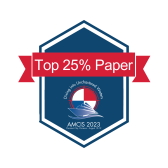Loading...
Paper Type
ERF
Description
Misinformation has been on the rise, and in many cases, misinformation is intentionally shared for political reasons. This phenomenon first started with political news but now has spread in consumer products. To understand how misinformation sharing occurs differently between politicized versus non-politicized products, we conducted an experiment and survey 800 respondents in an online crowdsourcing platform. The results show that for a politicized product, individual bias disposition and social norms indeed sway an individual’s evaluation of information credibility, her trust and intention to share. However, this effect is not observed for non-politicized products. This call for more research to understand the role of social norms in stopping the spread of misinformation.
Paper Number
1432
Recommended Citation
Bui, Quang Neo and Moriuchi, Emi, "Social Norms and Misinformation Sharing of Politicized Products" (2023). AMCIS 2023 Proceedings. 9.
https://aisel.aisnet.org/amcis2023/social_comput/social_comput/9
Social Norms and Misinformation Sharing of Politicized Products
Misinformation has been on the rise, and in many cases, misinformation is intentionally shared for political reasons. This phenomenon first started with political news but now has spread in consumer products. To understand how misinformation sharing occurs differently between politicized versus non-politicized products, we conducted an experiment and survey 800 respondents in an online crowdsourcing platform. The results show that for a politicized product, individual bias disposition and social norms indeed sway an individual’s evaluation of information credibility, her trust and intention to share. However, this effect is not observed for non-politicized products. This call for more research to understand the role of social norms in stopping the spread of misinformation.
When commenting on articles, please be friendly, welcoming, respectful and abide by the AIS eLibrary Discussion Thread Code of Conduct posted here.




Comments
Social